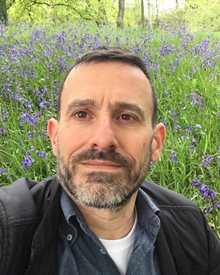Adam Schembri

I am Professor of Linguistics in the Department of English Language and Linguistics. My research interests are focused around sign languages, including sociolinguistics (looking at how sign languages vary and change over time) and linguistic typology (how signed and spoken languages are both similar and different from each other). I have been at the University of Birmingham since January 2016. In the past, I worked at the Deafness Cognition and Language Research Centre at University College London, at the University of Bristol, and at La Trobe University in Melbourne, Australia (my home country).
Being a gay teenager in the 1980s, it was very difficult for me to come out. Homosexuality was only decriminalised in 1984 in New South Wales, my home state, just one year before I came out. My parents were very Catholic and it took them a long time to accept me. But I think the most difficult thing about my coming out at that time was the HIV crisis. When I began a relationship at the age of 19, my older boyfriend was HIV positive and I was not, and that put an awful anxiety at the heart of our relationship. During the 9 years we were together, I was always worried that perhaps I would lose him, and he was always worried that some accident would led to my seroconversion.
Although I quickly came to accept myself and be comfortable with who I was, I went through a period where I found myself having little contact with straight people outside family and some close friends. Most straight people I knew had little appreciation of the horror of HIV, so it was very isolating. I struggled to feel completely accepted by straight people, partly because of family rejection and also of the fact that when I came out to some of my straight friends at university, a lot of them said that I was just going through a phase or that I was just being ‘trendy’ (partly because many of them knew I had had a girlfriend before). As a result of this, I threw myself into the gay community and basically had few really close straight friends for a number of years. Looking back now, I can see that this was an awful over-reaction, but perhaps I needed time to build my gay identity.
I have always been a believer in the importance of coming out, so in every single job I’ve ever held I have been out as a gay man. It sometimes is something I mention in class – I sometimes use anecdotes in my teaching, so often it may simply come up. But I do it naturally, by referring to my boyfriend or ex-partner. People talk about their partners and their families in their workplace, so I believe that people should not be hiding who they are. I recognise that some people may not want to make others feel uncomfortable, but I do think it is important to be out.
Although there is more widespread acceptance today, many young people still struggle with coming out. This may be especially true of young people from religious backgrounds. It may seem a lot easier for people to come out as gay or lesbian today, but it is still not as easy as it should be, and still especially difficult for some. So, I believe that anything that can signal that the University accepts that staff can be role models for young LGBT people is useful.
Universities are very LGBT friendly overall in the English-speaking world compared to other institutions. Even in the 1990s, it was never an issue for me as a PhD student and postgraduate teaching assistant. I think Universities, in general, are very LGBT friendly, but the University of Birmingham seems to be particularly friendly, which is great.